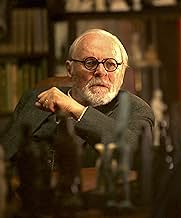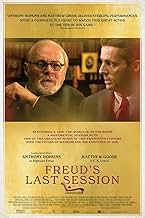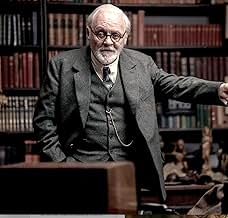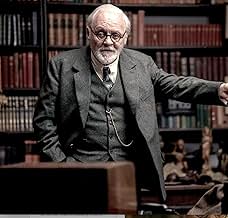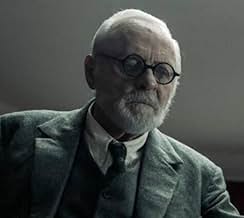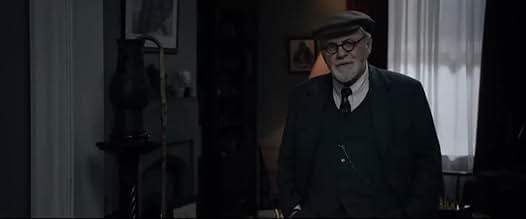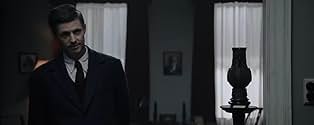Ajouter une intrigue dans votre languePsychoanalyst Sigmund Freud invites professor C.S. Lewis to debate the existence of God, Freud's unique relationship with his daughter, and Lewis' unconventional relationship with his best f... Tout lirePsychoanalyst Sigmund Freud invites professor C.S. Lewis to debate the existence of God, Freud's unique relationship with his daughter, and Lewis' unconventional relationship with his best friend's mother.Psychoanalyst Sigmund Freud invites professor C.S. Lewis to debate the existence of God, Freud's unique relationship with his daughter, and Lewis' unconventional relationship with his best friend's mother.
- Prix
- 1 nomination au total
George Andrew-Clarke
- Paddy Moore
- (as a different name)
Anna Amalie Blomeyer
- Ilsa
- (as Anna Blomeyer)
Histoire
Le saviez-vous
- AnecdotesThe waltz, called "And the Waltz Goes On" that is played right before the end cards was composed by Anthony Hopkins.
- GaffesLewis refers to JRR Tolkien as "John". He was known as "Ronald" to his friends.
- Citations
[last lines]
Sigmund Freud: From error to error, one discovers the entire truth.
- ConnexionsFeatured in The 7PM Project: Episode dated 19 April 2024 (2024)
- Bandes originalesVariations on an Original Theme, Op. 36, 'Enigma' Variation 9: Nimrod
Composed by Edward Elgar
Performed by Symfonický orchester Slovenského rozhlasu (as Slovak Radio Symphony Orchestra) & Adrian Leaper (Conductor)
Licensed courtesy of Naxos Music UK Ltd
Commentaire en vedette
Hopkins playing Freud was bound to be hit or miss. Unfortunately, he delivers here one of his familiar, highly mannered performances. Whenever this "Freud" opens his mouth, he speaks in the same rapid, slightly eccentric rhythm Hopkins favors. Then he pauses, reflects a moment, flashes a sudden rueful grin, and utters a little chuckle or cackle. It's been Hopkins' default style throughout his career (at least when not playing Lecter), this time with a Viennese accent. I doubt Freud was ever so hammy.
My faith was also shaken early in the movie when, for no discernible reason, the order of two famous events was reversed. On September 3, 1939, Prime Minister Chamberlain announced over the radio that the nation was at war with Germany. A few minutes later, air raid sirens went off, terrifying London's populace. (It proved to be a false alarm.) For some reason, the movie has the false air raid preceding the declaration of war.
It also features, in connection with Chamberlain's broadcast, an old bête noire of mine: A large group of psychologists is listening to his historic speech on the radio, and when it's over, the BBC announcer says something like "That ends the Prime Minister's message" -- at which point someone (is it Anna Freud?) snaps off the radio. No one would do that in real life, with war just declared and with urgent government announcements yet to follow (and there were plenty of them).
One further complaint: the clumsy way flashbacks are shoehorned into the narrative, giving us the backstories of Freud, Lewis, and Anna, with a heavy emphasis on Anna's lesbianism.
Incidentally, considering that C. S. Lewis was one of the most brilliant speakers in Britain -- eloquent, persuasive, never at a loss for words -- he is uncharacteristically tight-lipped, timid, and hesitant in this movie, even for someone being courteous to a revered, dying old man. Armand Nicholi's fanciful book "The Question of God," one of the inspirations for this movie, lets the two iconic figures battle it out, with Lewis (and God) ultimately gaining the upper hand. But in this movie's version of that imaginary encounter, Lewis has little to say. It is all Freud's show.
At least the movie is handsomely mounted; it's nice to see what Freud's office must have looked like. That aside, I can't see the point of the movie. Is it just to give Hopkins the chance to do another bad impersonation of a historical figure?
My faith was also shaken early in the movie when, for no discernible reason, the order of two famous events was reversed. On September 3, 1939, Prime Minister Chamberlain announced over the radio that the nation was at war with Germany. A few minutes later, air raid sirens went off, terrifying London's populace. (It proved to be a false alarm.) For some reason, the movie has the false air raid preceding the declaration of war.
It also features, in connection with Chamberlain's broadcast, an old bête noire of mine: A large group of psychologists is listening to his historic speech on the radio, and when it's over, the BBC announcer says something like "That ends the Prime Minister's message" -- at which point someone (is it Anna Freud?) snaps off the radio. No one would do that in real life, with war just declared and with urgent government announcements yet to follow (and there were plenty of them).
One further complaint: the clumsy way flashbacks are shoehorned into the narrative, giving us the backstories of Freud, Lewis, and Anna, with a heavy emphasis on Anna's lesbianism.
Incidentally, considering that C. S. Lewis was one of the most brilliant speakers in Britain -- eloquent, persuasive, never at a loss for words -- he is uncharacteristically tight-lipped, timid, and hesitant in this movie, even for someone being courteous to a revered, dying old man. Armand Nicholi's fanciful book "The Question of God," one of the inspirations for this movie, lets the two iconic figures battle it out, with Lewis (and God) ultimately gaining the upper hand. But in this movie's version of that imaginary encounter, Lewis has little to say. It is all Freud's show.
At least the movie is handsomely mounted; it's nice to see what Freud's office must have looked like. That aside, I can't see the point of the movie. Is it just to give Hopkins the chance to do another bad impersonation of a historical figure?
- 210west
- 28 mai 2024
- Lien permanent
Meilleurs choix
Connectez-vous pour évaluer et surveiller les recommandations personnalisées
- How long is Freud's Last Session?Propulsé par Alexa
Détails
- Date de sortie
- Pays d’origine
- Langues
- Aussi connu sous le nom de
- Останній сеанс Фройда
- sociétés de production
- Consultez plus de crédits d'entreprise sur IMDbPro
Box-office
- Brut – États-Unis et Canada
- 906 283 $ US
- Fin de semaine d'ouverture – États-Unis et Canada
- 45 590 $ US
- 24 déc. 2023
- Brut – à l'échelle mondiale
- 3 491 173 $ US
- Durée1 heure 50 minutes
- Couleur
Contribuer à cette page
Suggérer une modification ou ajouter du contenu manquant

Lacune principale
What is the Canadian French language plot outline for Freud's Last Session (2023)?
Répondre





